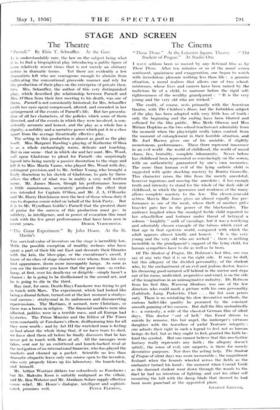The Cinema
"These Three." At the Leicester Square Theatre - --" The Student of Prague." At Studio One I HAVE seldom been so moved by any fictional film as by These Three. After ten minutes or so of the usual screen
sentiment, quaintness and exaggeration, one began to watch With incredulous pleasure nothing less than life : a genuine situation, a moral realism that allows one of two school- mistresses, whose lives and careers have been ruined by the malicious lie of a child, to murmur before the rigid self- righteousness of the wealthy grandparent : " It is the very young and the very old who are wicked."
The credit, of course, rests primarily with the American theatre, with The Children's Ilour, but the forbidden subject of the play has been adapted with very little loss of truth : only the beginning and the ending have been blurred and softened for the film public. Miss Merle Oberon and Miss Miriam Hopkins as the two school-teachers act admirably from the moment when the playwright really takes control, from►
the moment of entanglement in their horrible situat' , and Mr. Joel Macrea gives one of his amiable, if slightly monotonous, performances. These three represent innocence in an evil world—the world of childhood, the world of moral chaos, lies, brutality, complete inhumanity. Never before has childhood been represented so convincingly on the screen, with an authenticity guaranteed by one's own memories. The more than human evil of the lying sadistic child is suggested with quite shocking mastery by Bonita Granville. This character raises the film from the merely anecdotal, however ingenious and moving the anecdote ; it has enough truth and intensity to stand for the whole of the dark side of childhood, in which the ignorance and weakness of the many allows complete mastery to the few. The eleven-year-old actress Marcia Mae Jones gives an almost equally fine per- formance as one of the weak, whose theft of another girl's bracelet puts her in the power of the blackmailer. The audience laughed when the smudged feeble child repeated to her schoolfellow and torturer under threat of betrayal a solemn " knightly " oath of vassalage, but it was a terrifying and admirably chosen example of the taboos which exist at that age in that egotistic world, compared with which the adult appears almost kindly and honest. " It is the very young and the very old who are wicked " : there is nothing incredible in the grandparent's support of the lying child, for human sympathies have to die as well as be born.
Of The Student of Prague, Dr. Robison's last film, one elm say at any rate that it is on the right side. It may be dull, but this allegory of the divided personality, of the student who, by the enchantment of an evil and jealous doctor, leaves his dreaming good-natured self behind in the mirror and steps out of his room, undivided, acquisitive and cruel, is on the side of the imagination in an unimaginative industry. Dr. Robison from his first film, Warning Shadows, was one of the few directors who could mark a picture with his own personality (Lubitsch, Lang, Pudovkin, Clair . . . the list soon peters out). There is no mistaking his slow decorative methods, the curious ballet-like quality he procured by the constant smooth panning of his camera. But dull the film undoubtedly is : a curiosity, a relic- of the classical German film of silent days. This doctor " out of hell," this Faust driven to suicide by remorse, this fair angel, the innkeeper's virtuous daughter with the horseface of awful Teutonic integrity : one admits their right in such a legend to feel, not as human beings do feel, but as they ought to feel, granted the faith be- hind the symbol. But one cannot believe that this neo-Gothic fantasy really represents any faith ; the allegory doesn't satisfy, the sense of evil, one suspects, is there for merely decorative purposes. Nor does the acting help. 7'he Student of Prague of silent days was more memorable ; the magnificent foxhunt when the hounds wheeled across the fields as the enchanter turned his hand ; the moment when Conrad Veldt as the damned student went down through the woods to the duel he had no intention of fighting, and met his other self mounting the hill with the damp blade that showed he had been more punctual at the appointed place.
GRAHAM GREENE.














































 Previous page
Previous page